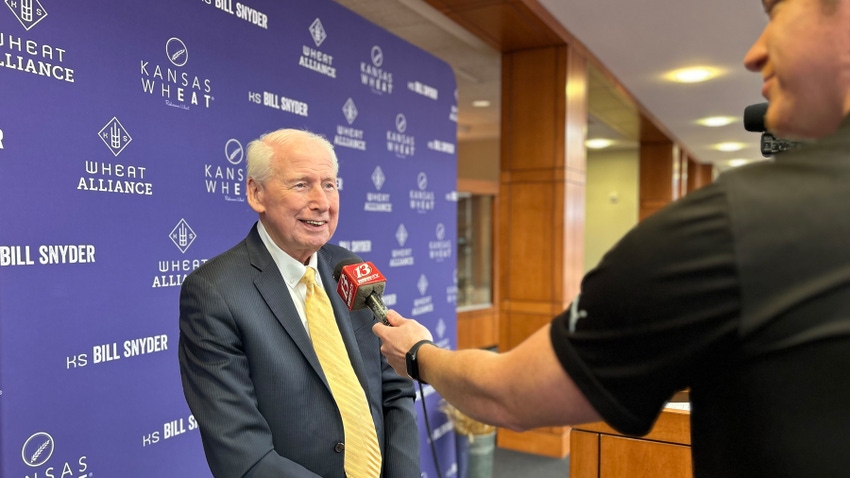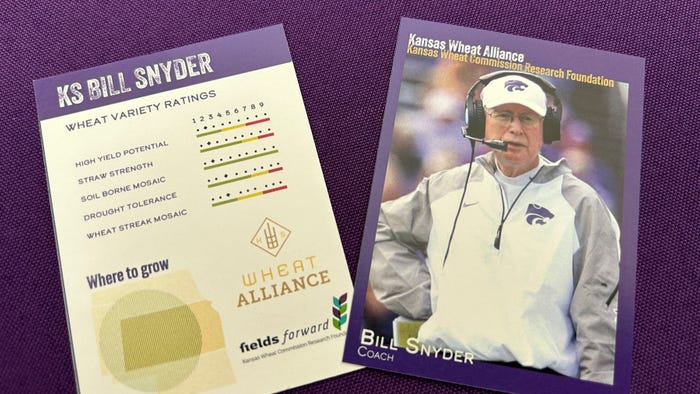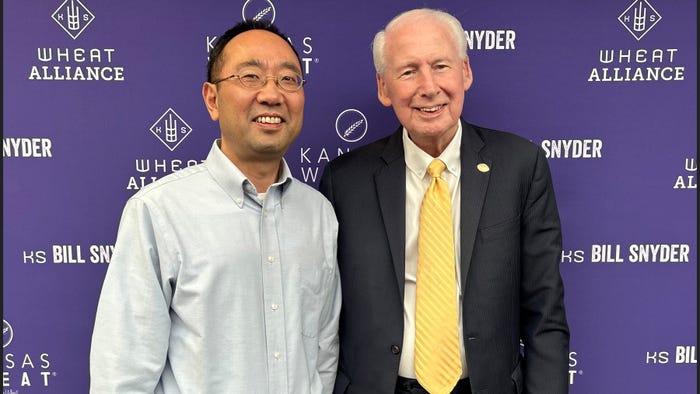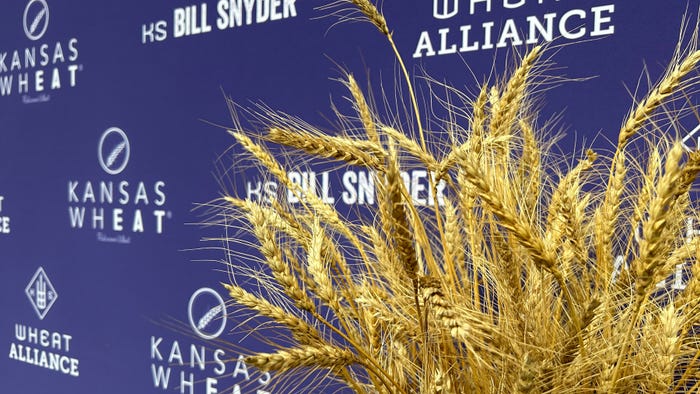
Retired coach Bill Snyder has gathered a lot of accolades in his long and storied career as a head football coach for Kansas State University.
Multiple conference and national coach of the year awards. A trophy case full of bowl trophies in the stadium that bears his name, Bill Snyder Family Football Stadium at Kansas State. Induction into the College Football Hall of Fame in 2015.
And now he joins the ranks of former Sen. Bob Dole and other Kansas dignitaries with the ultimate recognition: a wheat variety named on his behalf, “KS Bill Snyder.”
This latest hard red winter wheat variety was released by the Kansas State University wheat-breeding program and is licensed by Kansas Wheat Alliance seed associates for farmers to plant this fall.
“It’s very rare that a wheat variety is named after a person, and Coach Snyder is certainly worthy of that for everything he’s done for Kansas, and especially rural Kansas,” said Aaron Harries, Kansas Wheat vice president of research and operations.
Persistence
In coaching, sometimes you think 10 yards at a time. In wheat breeding, you think 10 years at a time. Both take dedication and persistence to find the win.
In his remarks at the March 14 unveiling of the “KS Bill Snyder” wheat variety, Kansas Wheat CEO Justin Gilpin said it’s always exciting when a new wheat variety is released out of the Kansas State University wheat-breeding program.
There’s so much investment of time and resources in developing that wheat, he said, from the farmer checkoff dollars that support the program to the efforts of the wheat breeder.
“It takes 10 years, over a decade, potentially, for that wheat variety,” Gilpin said. “That wheat breeder is making decisions, being diligent, looking at test plots and data.”
It’s a lot like the tireless work that Snyder put into breaking down games and thinking about strategy, he added.
And much like Snyder is credited with turning around a losing football program and injecting new life and vitality into the university, a new wheat variety can do the same for farmers, Gilpin said.

TRADING CARD: Commemorative trading cards for “KS Bill Snyder” were given to attendees.
“As we stand here today in the shadows of Bill Snyder Family Stadium, it’s hard not to recognize the meaningful impact that he’s had not only on a football program but a university, a community, a state,” Gilpin said. “And now we have a variety that our farmers are going to have as an option to be able to choose, with other good genetics that are out there, to help increase returns for the ag economy in the state of Kansas.”
Field to field
Developing home-grown talent on the football field is a lot like the investment in a public wheat-breeding program. Long hours and a commitment to looking to local experts for wins are both hallmarks.
Snyder remarked that in the early-morning and late-night hours of traveling to and from his office at the stadium, he would drive past the university agronomy research plots and see the lights of the greenhouses. You can’t do that without thinking about all the people who are doing so much to make dramatic differences in the lives of so many, he said.
Snyder was known as a recruiter of home-grown football talent, and several of the past players on his roster came from the farms and ranches of Kansas.
“What I appreciated about them and what I saw in them, and the reason that I wanted them in our program is they understood what doing right was about,” he said.
That same attitude and spirit of doing right by others is apparent in the university’s work for farmers.
“You are so good at what you do, and what you do is meaningful,” Snyder said. “That has always given me such great respect for the Commission and the people who work in this building, and the farmers all over the world who raise the wheat.”
To mark the occasion, Kansas Wheat and the Kansas Wheat Alliance presented Snyder with another version of his classic purple windbreaker featuring their logos — perfect for scouting talent on the football field or scouting in a wheat field.
Goal line
The “KS Bill Snyder” variety was developed by Guorong Zhang, a Kansas State wheat breeder based at the Agricultural Research Center in Hays, Kan.
It’s a medium maturity and medium-short height variety of hard red winter wheat that has a wide adaptability and, in particular, for the western half of the state, Harries said.
“It’s got good yield potential and, more importantly, drought tolerance,” Harries added.
It’s also got a really good quality that millers and bakers could find as an advantage.

COMMONALITIES: There are a lot of commonalities between the work of Kansas State University wheat breeder Guorong Zhang, left, and former K-State head football coach Bill Snyder, right. Dedication, a long-term vision and a commitment to excellence are just a few.
Zhang said it works very well in both dryland and irrigated production, offering a high yield potential. In 2022, it was tested in the Southern Regional Performance Nursery, and it was the top-yielding wheat that year, he added.
Important to western Kansas growers is its disease-resistance package, which Zhang has been working to improve in his breeding program.
“KS Bill Snyder” features good-to-intermediate resistance of stripe, leaf and stem rust, along with moderate resistance to wheat streak mosaic virus through the Wsm2 gene and intermediate resistance to the Triticum mosaic virus.
It’s also resistant to soilborne mosaic virus, which means growers in central Kansas could grow it as well.
Zhang said “KS Bill Snyder” also has very good standability in the field, even with its higher yields, with high-tillering capacity and excellent straw strength.
A wheat that stands tall in high winds, yields well and is known for quality? It should be worthy of its namesake, Harries said.

CHAMPION WHEAT: “KS Bill Snyder” topped the Southern Regional Performance Nursery yield trial in 2022. The hard red winter wheat, with its solid disease package, good drought tolerance and very high yield potential, was named in honor of former K-State head football coach Bill Snyder.
Snyder’s 16 goals for success
Dr. Marty Vanier, representing the Vanier family, who made the lead gift in the Kansas Wheat “Fields Forward” campaign, spoke at the release celebration.
The Vaniers have a long history of supporting Kansas State University and are friends of Coach Snyder.
She said Snyder’s “16 goals for success” are applicable not only on the football field but also in the wheat field.
Commitment to excellence. Kansas State’s long and historic wheat-breeding program is led by breeders who have a commitment to providing excellent varieties for farmers to grow, Vanier said.
Unselfishness. There’s something unselfish about public wheat-breeding programs that are meant to benefit all farmers and all communities, she said.
Unity. Kansas wheat farmers working with public wheat breeders is a show of unity for a common goal of innovation and progress, Vanier said.
Improve every day. The relentless pursuit to improve and refine wheat varieties exemplifies the spirit of continuous growth and development, she said.
Be tough. The “KS Bill Snyder” variety was bred to withstand both central and western Kansas climates, both of which can be pretty rough on wheat, Vanier said.
Self-discipline. “Your discipline and adhering to rigorous standards and methodologies in your research undoubtedly contributed to the success of this wheat,” she said to the wheat breeder, Guarong Zhang.
Great effort. It takes 10 to 12 years to get a wheat variety across the goal line and earn its release date and name.
Enthusiasm. In a room full of wheat farmers, industry leaders, researchers and others in Kansas agriculture, it’s easy to see the enthusiasm for Kansas agriculture and wheat cultivation shine through, Vanier said.
Eliminate mistakes. It takes meticulous attention to detail to pave the way for a wheat variety, she said.
Never give up. It’s as true for wheat breeders as it is for football players, Vanier said.
Don't accept losing. "You’ve demonstrated that you don’t accept losing by pushing the boundaries to achieve success in wheat innovation,” she told the audience.
No self-limitations. Wheat breeders, by definition, explore new frontiers with each pairing to try to develop a variety that will improve performance in the field and in the bakery.
Expect to win. Kansas, she said with a smile, consistently ranks No. 1 in wheat and wheat products exported.
Be consistent. “I refer you back to No. 13,” she added with a grin.
Leadership. The university, Kansas Wheat and the Kansas Wheat Alliance each has demonstrated leadership in the industry in the state and around the nation.
Responsibility. Kansas wheat growers and the industry as a whole show their commitment to being responsible stewards of the land, the seeds, and always improving productivity and quality along the way.
About the Author(s)
You May Also Like






